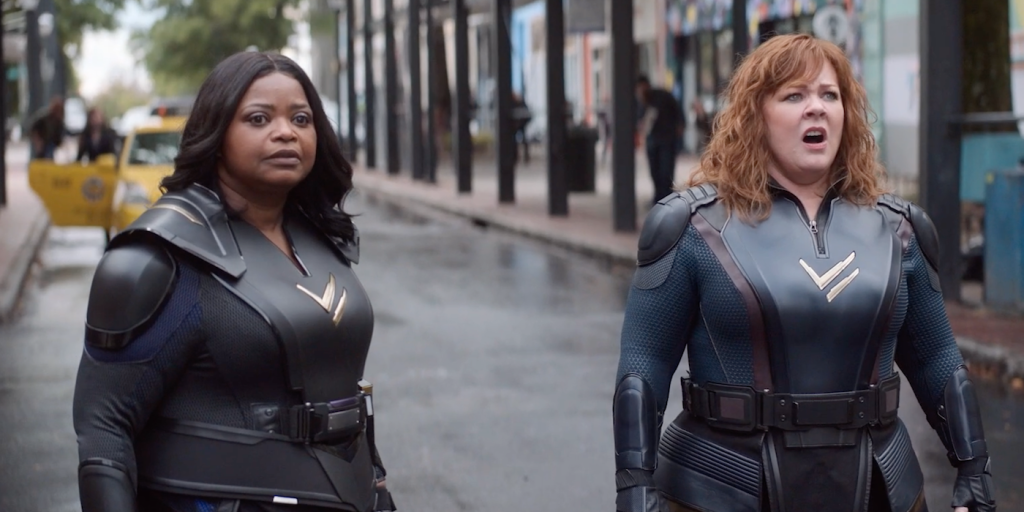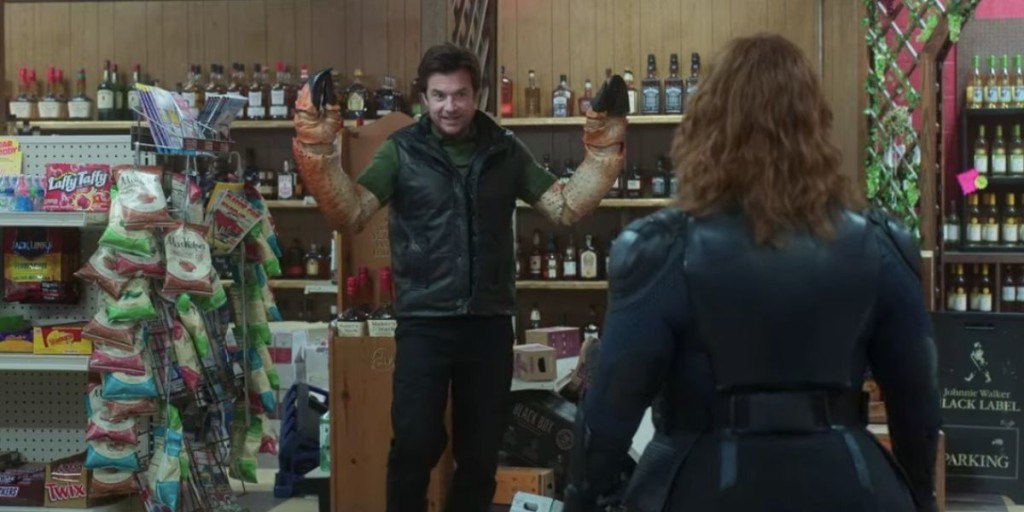Genre: Comedy
Premise: Two high school friends that had a falling out reunite and become superheroes as adults to take on the growing supervillain problem in the city.
About: Thunder Force is the latest collaboration between Melissa McCarthy and her husband, Ben Falcone. The two have made several movies together, including Superintelligence, Life of the Party, The Boss, and Tammy. Falcone does not contain any writing or directing credits that don’t include McCarthy except for The Looney Toons Show, which he wrote 12 episodes of. Possibly the biggest leap in the business without proving one’s self since Barbara Streisand’s infamous hairdresser, Jon Peters, made the leap to producing.
Writer: Ben Falcone
Details: 105 minutes
One of you made a good point the other day.
You said, “You should review Thunder Force because all of us have had some version of this idea at some point.”
Great observation. We’ve all had the ‘regular people become superheroes’ comedy concept before. We finally get to see what comes of that idea when you turn it into a movie.
Now you’re probably saying, “Really Carson? You’re going to review Thunder Force? What’s the point? All you’re going to do is bash it and marvel at how the untalented Ben Falcone gets to make stinker after stinker while much more talented writers are forced to wait on the sidelines.”
That’s true.
But, believe it or not, Thunder Force is a great movie to learn from. Not because it’s bad. That would be easy. No, Thunder Force is a great movie to learn from because it’s the most average average movie ever.
There’s an old saying in life. Play to win. Don’t play not to lose. Ben Falcone plays not to lose. And it’s going to teach all of us a lesson on how to be better comedy writers.
If you haven’t seen the film, it follows two girls who meet in high school and become fast friends. There’s Lydia Berman, a hard-partying scatterbrain who doesn’t take school seriously enough. And Emily Stanton, a geeky girl whose parents were killed by a supervillain. Because of this, Emily plans to dedicate her life to becoming a genius who can turn regular people into superheroes so they can beat the supervillains.
Oh yeah, regarding superheroes. Currently, the only kinds of superheroes there are in the world are villains, who the media have tabbed, ‘miscreants.’ This is why Emily must succeed at her job. If she doesn’t create superheroes, the miscreants will take over the planet.
Lydia and Emily had a falling out at the end of high school and, now that they’re adults, Lydia is finally ready to repair their relationship. She heads over to Emily’s gigantic tech-lab and, after reminiscing about old times, accidentally injects herself with Emily’s life’s work – a super-serum. Once the super-serum is in you, you can’t go back. Which means Lydia is permanently a superhero now. And Emily is forced to train her.
While Lydia trains (a process that basically involves getting stronger), Emily injects herself with her own superpower – invisibility. Once that takes hold, it’s off to fight the miscreants. The plot then boils down to a secret miscreant who’s running for mayor and Thunder Force (their new team name!) trying to take him and his miscreant team down before it happens. Oh, and just in case you were wondering, hi-jinx ensue!
Like I said at the beginning of this review, Ben Falcone is not bad at his job.
He’s average.
He gets away with it because he’s got a movie star wife. But there’s no getting around the fact that he’s mind-numbingly average.
What does that mean, average?
How can you make sure that you, the aspiring comedy writer who does not have a movie star spouse, are not average?
Simple. DON’T MAKE AVERAGE CHOICES.
Every decision you make in a screenplay is a choice. That line of dialogue you’re writing is a choice. The character you choose to play opposite your hero is a choice. The situations you put your characters in, they’re a choice. Bad writers make bad choices in these moments. Good writers make good choices. And average writers make average choices.
There is a formula for making sure you don’t make bad choices. It goes something like this.
Your talent level + Offsetting effort = good choice.
If your talent level is high, most of your initial choices will be good. If your talent level is low, you will have to work much much harder to create good choices. That means never going with your first or second choices, always digging deeper. And it means a lot more drafts than the talented writer. This is because more drafts means more opportunity to spot your subpar choices and change them.
But what does an average choice actually look like?
The most common average choice in comedy is a *dated joke.* In Thunder Force, because Emily doesn’t have a real superpower, Falcone gives her… a taser. Yes, that’s right. The taser joke, a joke that has literally been around for 12 years (remember it in The Hangover), is used prominently in Thunder Force as it is Emily’s main weapon. Ironically, the first character it’s used on in the movie is played by, you guessed it, Ben Falcone.
But the failure of this choice actually goes much deeper. You are writing a comedy about superheroes. WHY THE F&%$ ARE YOU GIVING ONE OF THEM A TASER?????? The operating principle of every script is mine your choices FROM YOUR CONCEPT. A taser could be in any movie. ANY MOVIE. Why are you using it in a superhero movie? This choice is unforgivable.
It also leads us to the movie’s main problem.
Emily.
Falcone came up with a solid dynamic between Lydia and Emily EMOTIONALLY. One of them was the big wild crazy one. The other was the reserved quite introverted one. That dynamic worked great when they were kids.
But it doesn’t work at all for the comedic purposes of the film.
Instead, the comedic dynamic is one-sided. It’s Melissa McCarthy doing her Melissa McCarthy thing and Octavia Spencer off to the side occasionally mumbling “Okay, so where do we go next?”
Whenever you write a comedy two-hander, you need to get three things right. You need to make the first character funny. You need to make the second character funny. And you need to make them FUNNY TOGETHER (see Rush Hour, The Other Guys, 21 Jump Street, The Heat). Falcone appeared to be so focused on getting the emotional dynamic right that he forgot to make Emily funny, which, in turn destroyed any chance of a funny dynamic between his leads.
There’s an early scene in a convenience store where Thunder Force is taking on some bad guys. Emily literally disappears and Lydia takes down all the bad guys herself. It’s such a one-woman-show that when Emily reappears, I’d forgotten she was still here. If you have an entire set piece in your comedy where your co-star doesn’t have a single joke, you’re doing it wrong.
I know exactly how Falcone stumbled upon this mistake.
He fell in love with this idea that Emily has always been “invisible” in life. Therefore, it would be the PERFECT SUPERPOWER TO GIVE HER! Right? Cause theme? Invisibility for the invisible girl! YES!!!! – I got news for you, sweetie. If you’re making choices in critical parts of your comedy that favor theme over laughs, you lose. I know some people are going to push back on that. They’re wrong. If we’re not laughing, YOUR COMEDY IS A FAILURE. Appeasing USC film professors doesn’t make up for a theater full of people not laughing.
Emily is a disaster of a choice. And since she’s in 85% of the movie, that means your movie isn’t funny. You can recover from an unfunny side character. You can’t recover from an unfunny co-star. And these are the choices average writers make.
The best way for average writers to play above their pay grade is to get tough feedback. You need people telling you, “These are average choices. You need to do better.” Melissa McCarthy doesn’t seem like the kind of person who’s going to tell her husband that Emily is the most boring character ever. I’m guessing he gets a lot of encouragement from her. Encouragement is THE WORST THING YOU CAN GIVE AN AVERAGE WRITER. They start living in dream land. They believe their stuff is better than it is. That they don’t have to try as hard when the opposite is true.
Recently, I’ve been getting a lot of feedback on the tennis script I’m producing and the feedback is HARSH. Stuff like, “THIS ENTIRE SUBPLOT WAS LAME.” I LOVE that. When you’re not one of the geniuses, you need people calling you out. It’s the only way you’re going to push beyond your skill level.
This is probably more analysis than Thunder Force deserves. Most people will watch this movie and forget it a day later. But I read a Thunder Force-like screenplay every couple of weeks – an average spec where the writer isn’t talented enough to write a half-baked execution of his idea. The bar is much higher than you think it is. On all scripts, but especially comedy. Unless, of course, your wife is the biggest comedy actress in the world.
[ ] What the hell did I just watch?
[x] wasn’t for me
[ ] worth the stream
[ ] impressive
[ ] genius
What I learned: Make structure work for you, not against you. If you’re using a screenplay structure that divides your script into sections (for example, eight 12-page sequences), don’t stubbornly keep to that if it’s not working. One of the early sequences in Thunder Force is a training sequence. That training sequence starts at minute 30 and ends at minute 42. It’s exactly 12 pages. The problem? Falcone only needed half of those pages. Within six minutes, we were already repeating beats. It was at this moment that I first started losing interest. So, look, don’t dogmatically stick to a section page count just because the structure says you have to. If it’s not working for you, rework it until you need all those pages or MOVE ON TO THE NEXT SEQUENCE.



